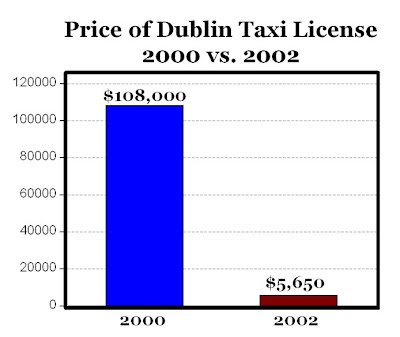
From the article "Regulatory Capture, Property Rights and Taxi Deregulation: A Case Study," by Sean D. Barrett in the Institute of Economic Affairs:
Pressure from incumbent taxi license holders, including brought a government decision in 1978 to limit the number of licences by statutory instrument. This led to the licenses acquiring a scarcity, monopoly value. As the Irish economy grew rapidly after 1987, the value of taxi licences rose rapidly to a high level by international standards. Dublin taxi numbers remained unchanged at 1,800 between 1978 and 1991, when there was an increase of 150. In 1997 there were 1,974 licences and on the eve of deregulation in late 2000 there were 2,721 licenses (see top chart above).
Restricting entry to the Irish taxi business became policy in an era of rapid economic growth. Between 1978 and 2000 the number of persons employed in Ireland increased by 63% from 1.1 million to 1.8 million. Unemployment fell from almost 18% in 1986 to 3.7% in 2001. The number of overseas visitors increased from 2 million to over 6 million in 2000.
The failure to increase taxi numbers in the fastest growing economy in the OECD caused widespread dissatisfaction because of the shortage of taxis in Dublin and elsewhere. Research found that 75% of those interviewed in street surveys disagreed or strongly disagreed with the statement that taxis "can be hired easily at peak times." A total of 72.6% of businesses experienced difficulties in obtaining a taxi, in particular between 4 and 6 p.m. In Dublin city centre some 9% of hourly observations resulted in average waiting times in excess of 15 minutes. During the period 11 p.m. to 4.00 a.m. waiting times in excess of 90 minutes were "frequently observed."
The price of a taxi licence in Dublin rose from I£3,500 ($7,385) in 1980 to I£90,000 ($108,000) in 2000 (MP: This represents an annual increase of 17.6%). Taxi license prices in Dublin were far above those in other European cities before deregulation in Ireland.
Market entry had been restricted from 1978 to 2000. A ministerial proposal to increase the number of taxis by just adding vehicles to existing taxi licences was challenged in the High Court by hackney drivers of private hire vehicles. In Irish transport law taxis are public hire vehicles which may be hailed on the street or at taxi ranks while hackneys are private hire vehicles which have to be hired by phone. The legal challenge was successful. Entry to the taxi sector was deregulated by the High Court and not just restricted to those with existing taxi licences. The High Court judgement stated that the restriction affected the right of people to work in the industry for which they were qualified and the right of the public to the services of taxis. The judgement also referred to the EU dimension of the case. It suggested that the proposed reform may discriminate against non-Irish residents as the great majority of current licence holders would be Irish. Following the deregulation judgement there was a dramatic increase in taxi numbers (see top chart above).
Since deregulation the local authority administration fee for the issue of a taxi licence is I£5,000 ($5,650, see bottom chart above). Large reductions in passenger waiting times have made deregulation popular among the public. There has not been a reduction in either driver or vehicle standards. Taxi deregulation in Ireland followed a restriction of new entrants for 22 years, the second half of which was a period of rapid economic growth.
The implications of the Irish High Court judgements concerning the rights of new market entrants to work in an industry for which they may be qualified and the rights of the public to services are significant in an economy with many cases of regulatory capture. If extended to other sectors the judgements would revolutionise the economy. Current legal opinion is that the taxi deregulation decision is indeed a turning point in Irish law dealing with property rights and market access. However, it is clear that concentrated producer interests are trying to use other aspects of the legal and regulatory framework to try to recapture monopoly rents.
MP: Intense market competition is often the best regulator of all, and the most effective protection for consumers against potential anti-market, anti-consumer behavior of producers. As Adam Smith wrote in the Wealth of Nations:
People of the same trade (e.g. taxi license holders) seldom meet together, even for merriment and diversion, but the conversation ends in a conspiracy against the public, or in some contrivance to raise prices. It is impossible indeed to prevent such meetings, by any law which either could be executed, or would be consistent with liberty and justice. But though the law cannot hinder people of the same trade from sometimes assembling together, it ought to do nothing to facilitate such assemblies; much less to render them necessary.
Post Title
→Consumers Gain from Taxi Deregulation in Ireland: More Taxis, Lower Prices, Shorter Wait Times
Post URL
→https://manufacturing-holdings.blogspot.com/2009/03/consumers-gain-from-taxi-deregulation.html
Visit manufacturing-holdings for Daily Updated Wedding Dresses Collection






